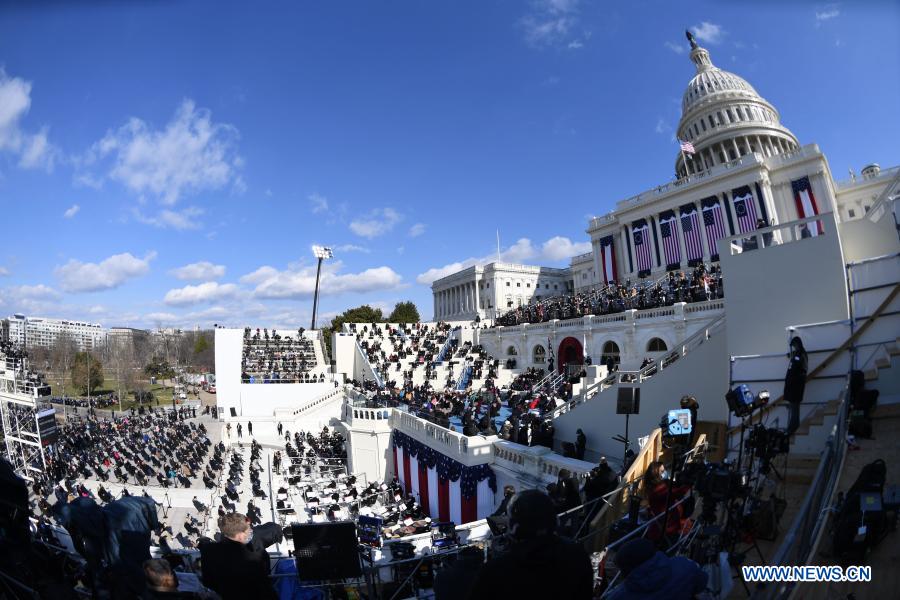New American administration, new US-China relations?
- ?By Mitchell Blatt
 0 Comment(s)
0 Comment(s) Print
Print E-mail China.org.cn, January 23, 2021
E-mail China.org.cn, January 23, 2021

Joe Biden was sworn in as the 46th president of the United States on Wednesday. As he mentioned in his inauguration speech, the new administration faces various daunting challenges, including the raging COVID-19 pandemic, growing inequity, the climate change crisis as well as a rise in political extremism, white supremacy and domestic terrorism, all of which will take significant efforts to tackle.
In addition, key foreign policy issues are also top of the agenda for Biden and his team, one of which is the relationship between the United States and China.
Despite the fact that the new American administration will continue the strategy of taking China as an adversary, under Biden, however, China-U.S. ties are likely to improve as the new president and his diplomats will provide more stability and cooperation on the policy level.
Instead of taking unilateral policies to try and frustrate China in every area, Biden's nominee for secretary of state Antony Blinken has proposed that the U.S. should cooperate with its allies and international organizations and try to lead by example. "Bringing the combined weight of partners and allies together, you're in a much better position to affect change and move the region in a positive direction than you are in retreating or acting alone," he said during an interview back in September. He also acknowledged that there are still some areas of potential cooperation with China.
Blinken's views broadly echo those Joe Biden himself has previously expressed and those of other national security nominees. Avril Haines, who will be director of national intelligence, said: "China is adversarial and an adversary on some issues, and in other issues we try to cooperate with them, whether in the context of climate change or other things."
Overall, officials in the Biden administration appear to take a much more nuanced view toward China and foreign policy than those serving under Trump. The previous administration viewed everything as a threat that should be dealt with by lashing out – even short-video apps like TikTok. The Biden administration looks set to focus on larger strategic concerns like trade and intelligence.
The Trump administration refused almost all attempts to cooperate with China on any issue. They tore up their copy of the Paris Agreement and did not talk with China about climate change, as the Obama-Biden administration did. In fact, Biden has outlined plans to rejoin the Paris climate accord as one of the first acts of his presidency.
Blinken has said that he believes a "full decoupling" of U.S.-China trade is impossible, and that Trump's trade war "harm[ed] our own people." Biden himself criticized the trade war during the run-up to the presidential election. Like Blinken, he thinks the U.S. should look to get all of its allies on the same page, stating: "It's going to be a major priority for me in the opening weeks of my presidency." It remains to be seen how closely America's allies plan to follow along with the strategy.
The Trump administration destroyed the trust many countries around the world had in America. Biden will make the case that he's a new president with more credibility. However, Trump wasn't the first American president to go it alone and tear up international deals. George W. Bush's misadventures in Iraq also cost the U.S. greatly on the world stage. Furthermore, the images of rioters smashing windows and attacking police officers inside the U.S. Capitol make the U.S. system appear unstable and unreliable to some foreign observers.
The European Union already agreed to an investment agreement with China in December of last year. The Comprehensive Agreement on Investment (CAI) codifies some of what Europe wanted from trade with China – leaving Europe with less need to work with the Biden administration.
According to Theresa Fallon, founder and director of the Centre for Russia, Europe, Asia Studies: "The CAI could weaken the Biden administration's efforts for closer EU-U.S. cooperation on China as they no longer trust the EU's offers of cooperation."
One of the biggest differences between the Biden and Trump administrations is that the Biden administration is made up of qualified professionals with knowledge and experience in foreign policy. The Biden administration has nominated people who have worked in diplomacy for decades – for both Democratic and Republican administrations – and people with experience at lower levels in the same departments. They know how to negotiate with foreign countries. They know what are the real interests and values of the United States. Even if they still view China as a challenge, they will handle relations in a more measured manner and be open to cooperating where possible.
Mitchell Blatt is a columnist with China.org.cn. For more information please visit:
http://91dzs.com/opinion/MitchellBlatt.htm
Opinion articles reflect the views of their authors, not necessarily those of China.org.cn.
If you would like to contribute, please contact us at opinion@china.org.cn.





